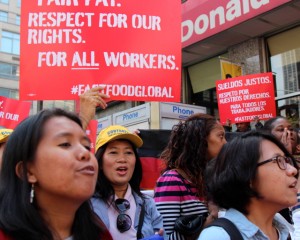
Fast food workers announce a global protest for a higher minimum wage outside a McDonald's restaurant in Manhattan on May 7, 2014. (Photo: BillMoyers.com/Neha Tara Mehta)
A campaign that began in 2012 with a brief walkout at one fast food restaurant in New York City has now spread across the country. The next round of fast food strikes arrives on Thursday, and organizers promise that it will be the biggest day of action so far.
BillMoyers.com asked Josh Eidelson, who covers labor for Salon, to give us a preview.
Eidelson:
What’s coming next is a round of strikes that will include workers in 150 cities and protests in over 30 countries on May 15. There will be strikes in cities that haven’t seen fast food strikes so far — cities like Philadelphia, Sacramento, Miami and Orlando. And there will be protests from Karachi to Casablanca to Dublin to Geneva to Buenos Aires; a teach-in at McDonald’s in Auckland, New Zealand; flash-mobs in the Philippines, and a strike in Italy the following day, May 16.
Eidelson says organizers have found it challenging to maintain the campaign’s momentum:
This is an escalation for a campaign that at every step has had to grapple with the question of, ‘How do you escalate?’ They are up against these mammoth corporations and have chosen — in a move that looks more clever now than it did at the beginning — to go after all of the companies in the industry instead of just one. Organizers know the fast food companies can sustain some damage to their brands, and they know they can sustain some loss of profits. So in order to keep the momentum going — and in order to engage more workers and build toward more of a mass movement — they have to keep escalating.
Eidelson recently uncovered internal documents from the National Restaurant Association that reveal how the industry views this campaign.
He tells BillMoyers.com:
These documents certainly have a different tone than the positions the industry has taken in public, where they have not only dismissed the merits of demands that include paying people $15 per hour and allowing workers to organize without intimidation, but they have also dismissed the relevance and the significance of these protests.
In private — in messaging to their members — we see them talking about the protests’ growing traction, we see them talking about the campaign becoming more coordinated, and we see them talking about how they’re going to push back. So it becomes very clear that the industry is aware that this is an unprecedented challenge.
Eidelson also details the restaurant lobby’s anxiety over the successes of the Restaurant Opportunity Center, whose co-director, Saru Jayaraman, spoke to Bill Moyers about the movement in February.
For more information about Thursday’s strikes, visit the Raise Up for $15 Facebook page.


